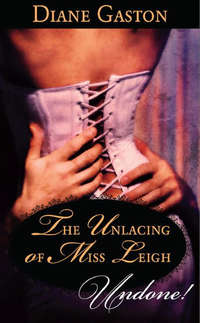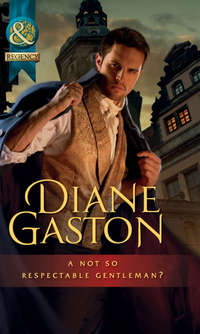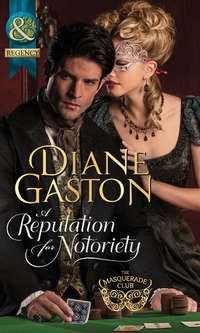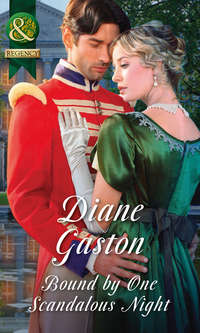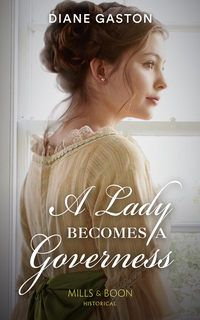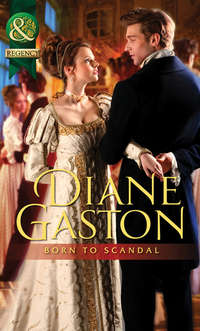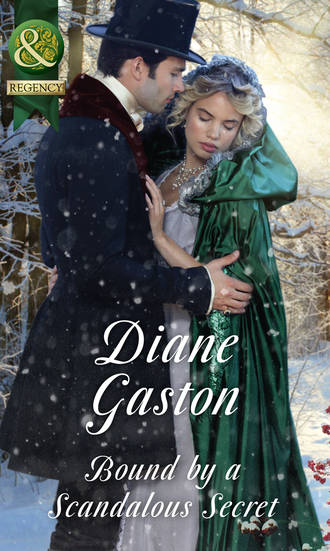
Полная версия
Bound By A Scandalous Secret
They came to the stream. The only way to cross was at the bridge, the bridge that had been flooded that fateful night Tess had been caught in the storm.
‘Leave me at the bridge,’ she said. No one was in sight, but if anyone would happen by, it would be on the road to the bridge. ‘I’ll walk the rest of the way.’
‘So we are not seen together?’ he correctly guessed.
She could not help but giggle. ‘Unless you want a forced marriage.’
He raised his hands in mock horror. ‘Anything but that.’
‘Here is fine.’ She slid from the saddle.
He unfastened her satchel and handed it to her. ‘It has been a pleasure, Miss Summerfield.’
‘I am indebted to you, sir,’ she countered. ‘But if you dare say so to anyone, I’ll have to unfurl my wrath.’
He smiled down at her and again she had the sense that she liked him.
‘It will be our secret,’ he murmured.
She nodded a farewell and hurried across the bridge. When she reached the other side, she turned.
He was still there watching her.
She waved to him and turned away, and walked quickly. She was later than she’d planned to be.
She approached the house through the formal garden behind the Hall and entered through the garden door, removing her half-boots which were soaked through and caked with snow. One of the servants would take care of them. She did not dare clean them herself as she’d been accustomed to do at Summerfield. If Lord Tinmore heard of it, she’d have to endure yet another lecture on the proper behaviour of a lady, which did not include cleaning boots.
What an ungrateful wretch she was. Most young ladies would love having a servant clean her boots. Genna simply was used to doing for herself, since her father had cut back on the number of servants at Summerfield House.
She hung her damp cloak on a hook and carried her satchel up to her room. The maid assigned to her helped her change her clothes, but Genna waited until the girl left before unpacking her satchel. She left her painting on a table, unsure whether to work on it more or not.
She covered it with tissue again and put it in a drawer. She would not work on it now. Of that she was certain. Instead she hurried down to the library, opening the door cautiously and peeking in. No one was there, thank goodness, although it would have been quite easy to come up with a plausible excuse for coming to the library.
She searched the shelves until she found the volume she sought—Debrett’s Peerage & Baronetage. She pulled it out and turned first to the title names, riffling the pages until she came to the Rs.
‘Rossdale. Rossdale. Rossdale,’ she murmured as she scanned the pages.
The title name was not there.
She turned to the front of the book again and found the pages listing second titles usually borne by the eldest sons of peers. She ran her finger down the list.
Rossdale.
There it was! And next to the name Rossdale was Kessington d. D for Duke.
She had been in the company of the eldest son of the Duke of Kessington. The heir of the Duke of Kessington. And she had been chatting with him as if he were a mere friend of her brother’s. Worse, she had hung all the family’s dirty laundry out to dry in front of him, her defiant defence over anticipated censure or sympathy. He’d seen her wild painting and witnessed her nonsense about Boadicea.
She turned back to the listing of the Duke of Kessington. There were two pages of accolades and honours bestowed upon the Dukes of Kessington since the sixteen hundreds. She read that Rossdale’s mother was deceased. Rossdale’s given name was John and he had no brothers or sisters. He bore his father’s second title by courtesy—the Marquess of Rossdale.
She groaned.
The heir of the Duke of Kessington.
Chapter Two
Ross sipped claret as he waited for Dell in the drawing room. The dinner hour had passed forty minutes ago, not that he’d worked up any great appetite or even that he was in any great need of company. He was quite content to contemplate his meeting with Miss Summerfield. He’d been charmed by her.
How long had it been since a young woman simply conversed with him, about herself and her family skeletons, no less? Whenever he attended a society entertainment these days all he saw was calculation in marriageable young ladies’ eyes and those of their mamas. All he’d seen in Miss Summerfield’s eyes was friendliness.
Would that change? Obviously she’d not known the name Rossdale or its significance, but he’d guess she’d soon learn it. Would she join the ranks of calculating females then?
He was curious to know.
The door opened.
‘So sorry, Ross.’ Dell came charging in. ‘I had no idea this estate business would take so long. I’ve alerted the kitchen. Dinner should be ready in minutes.’
Ross lifted the decanter of claret. ‘Do you care for some?’
Dell nodded. ‘I’ve a great thirst.’
Ross poured him a glass and handed it to him.
‘First there is the problem of dry rot. Next the cow barn, which seems to be crumbling, but the worst is the condition of the tenant cottages. One after the other have leaking roofs, damaged masonry, broken windows. I could go on.’ He took a swig of his wine.
‘Sounds expensive,’ Ross remarked with genuine sympathy.
How many estates did Ross’s family own? Five, at least, not counting the hunting lodges and the town house in Bath. There were problems enough simply maintaining them. Think of how it would be if any were allowed to go into disrepair. This was all new to Dell, as well. He’d just arrived in Brussels with his regiment when he’d been called back to claim the title. His parents, older brother and younger sister had been killed in a horrific fire. Ross had delivered the news to him and brought him home.
A few weeks later Dell’s regiment fought at Waterloo.
‘A drain on the finances, for certain,’ Dell said. ‘Curse Sir Hollis for neglecting his property.’
‘Do you have sufficient funds?’ Ross asked.
His friends never asked, but when Ross knew they were in need he was happy to offer a loan or a gift.
Dell lifted a hand. ‘I can manage. It simply rankles to see how little has been maintained.’ He shook his head. ‘The poor tenants. They have put up with a great deal and more now with this nasty weather.’
The butler appeared at the door. ‘Dinner is served, sir.’
Dell stood. ‘At least food is plentiful. And I’ve no doubt Cook has made us a feast.’
They walked to the dining room, its long table set for two adjacent to each other to make it easier for conversing and passing food dishes. The cook indeed had not disappointed. There were partridges, squash and parsnips. Ross’s appetite made a resurgence.
‘I hope your day was not a bore,’ Dell said. ‘Did you find some way to amuse yourself?’
‘I did remarkably well,’ Ross answered, spearing a piece of buttered parsnips with his fork. ‘I rode into the village and explored your property.’
‘And that amused you?’ Dell looked sceptical.
‘The villagers were talkative.’ He pointed his fork at Dell. ‘You are considered a prime catch, you know.’
Dell laughed. ‘I take it you did not say who you were.’
Not in the village, he hadn’t. ‘I introduced myself simply as John Gordon.’
‘That explains why there are no matchmaking mamas parked on the entry stairs.’
Ross smiled. ‘I do believe tactics were being discussed to contrive an introduction to you.’
Dell shrugged. ‘They waste their time. How can I marry? These properties of mine are taking up all my time.’
How many did he have? Three?
‘I’m not certain your actual presence was considered important.’ To so many young women, marrying a title was more important than actually being a peer’s wife. ‘In any event, it would not hurt to socialise with some of your more important neighbours, you know.’
‘Who?’ he asked unenthusiastically.
Ross took a bite of food, chewed and swallowed it before he answered. ‘They said in the village that Lord Tinmore was in the country.’
‘That prosy old fellow?’ Dell cried.
‘He’s influential in Parliament,’ Ross reminded him. ‘It won’t hurt at all to entertain him a bit. He might be a help to you when you take your seat.’
‘Your father will help me.’
‘My father certainly will help you, but it will not hurt to be acquainted with Tinmore, as well.’ Ross tore off some meat from his partridge. ‘You are related to Tinmore’s wife and her sisters, I was told.’
‘They are my distant cousins, I believe,’ Dell said. ‘The ones who grew up in this house.’
‘Perhaps they would like to visit the house again.’ Ross knew Genna would desire it, at least.
Dell frowned. ‘More likely they would resent the invitation. I learned today that, not only was the estate left in near shambles, but the daughters were left with virtually nothing. My father turned them out within months of their father’s death. That is why the eldest daughter married Tinmore. For his money.’
‘Seems you learned a great deal.’ No wonder Genna Summerfield sounded bitter.
Dell gave a dry laugh. ‘The estate manager was talkative, as well.’
‘Perhaps it would be a good idea to make amends.’ And it would not hurt for Dell to be in company a little.
Dell expelled a long breath. ‘I suppose I must try.’
Ross swirled the wine in his glass. ‘I would not recommend risking offending Lord Tinmore.’
Dell peered at him. ‘For someone with an aversion to politics, you certainly are cognizant of its workings.’
‘How could I not be? My father talks of nothing else.’ Ross refilled Dell’s glass. ‘I would not say I have an aversion, though. I simply know it will eventually consume my life and I am in no hurry for that to happen.’
Dell gulped down his wine and spoke beneath his breath. ‘I never wanted this title.’
Ross reached over and placed his hand on Dell’s shoulder. ‘I know.’
They finished the course in silence and were served small cakes for dessert.
When that too was taken away and the decanter of brandy set on the table, Dell filled both their glasses. ‘Oh, very well,’ he said. ‘I will invite them to dinner.’
Ross lifted his glass and nodded approvingly.
Dell looked him in the eye. ‘Be warned, though. The youngest sister is not yet married.’
Ross grinned. ‘I am so warned.’
* * *
Two days later, Genna joined her sister and Lord Tinmore at breakfast. Sometimes if she showed up early enough to share the morning meal and acted cheerful, she could count on being left to her own devices until almost dinner time. Besides, she liked to see if Lorene needed her company. There were often houseguests or callers who came out of obligation to the Earl of Tinmore. Most were polite to Lorene, but Genna knew everyone thought her a fortune hunter. Genna often sat through these tedious meetings so Lorene would not be alone, even though it was entirely Lorene’s fault she was in this predicament.
A footman entered the breakfast room with a folded piece of paper on a silver tray. ‘A message arrived for you, sir.’
Tinmore acknowledged the servant with a nod. The footman bowed and left the room again.
Tinmore opened the folded paper and read. ‘An invitation,’ he said, although neither Lorene nor Genna had asked. He tossed the paper to Lorene. ‘From your cousin.’
‘My cousin?’ Lorene picked up the paper. ‘It is from Lord Penford, inviting us to dinner tomorrow night at Summerfield House.’
Genna’s heart beat faster. Was she included?
‘We must attend, of course,’ Tinmore said officiously. ‘He peered over his spectacles at Genna. ‘You, too, young lady.’ He never called her by her name.
‘I would love a chance to see Summerfield House again!’ she cried.
Lorene did not look as eager. ‘I suppose we must attend.’
* * *
The next day Genna was determined not to agonise over what to wear to this dinner. After all, it would be more in the nature of a family meal than a formal dinner party. There would not be other guests, apparently, save his houseguest, perhaps. A small dinner party, the invitation said, to extend his hospitality to his neighbour and his cousins.
Genna chose her pale blue dress because it had the fewest embellishments. She allowed her maid to add only a matching blue ribbon to her hair, pulled up into a simple chignon. She wore tiny pearl earrings in her ears and a simple pearl necklace around her neck. She draped her paisley shawl over her arm, the one with shades of blue in it.
She met Lorene coming out of her bedchamber.
Lorene stopped and gazed at her. ‘You look lovely, Genna. That dress does wonders for your eyes.’
Genna blinked. Truly? She’d aimed to show little fuss.
‘Do I look all right?’ Lorene asked. ‘I was uncertain how to dress.’
Lorene also chose a plain gown, but one in deep green. Her earrings were emeralds, though, and her necklace, an emerald pendant. The dark hue made Lorene’s complexion glow.
Lorene looked like a creature of the forest. If Lorene were the forest, then Genna must be—what? The sky? Genna was taller. Lorene, small. Genna had blonde hair and blue eyes; Lorene, mahogany-brown hair with eyes to match. No wonder people whispered that they must have been born of different fathers. They were opposites. One earthbound. The other...flighty.
Genna put her arm around Lorene and squeezed her. ‘You look beautiful as always. Together we shall present such a pretty picture for our cousin he will wish he had been nicer to us.’
Lorene smiled wanly. ‘You are speaking nonsense.’
Genna grinned. ‘Perhaps. Not about you looking beautiful, though.’ They walked through the corridor and started down the long staircase. ‘What is he, anyway? Our fourth cousin?’
Lorene sighed. ‘I can never puzzle it out. He shares a great-great-grandfather or a great-great-great one with our father. I can never keep it straight.’
Genna laughed. ‘He got the fortunate side of the family, obviously.’
They walked arm in arm to the drawing room next to the hall where Lord Tinmore would, no doubt, be waiting for them. Before they crossed the threshold, though, they separated and Lorene walked into the room first, Genna a few steps behind her. Tinmore insisted on such formalities.
Lord Tinmore was seated in a chair, his neckcloth loosened. His valet, almost as ancient as the Earl himself, patted his forehead with a cloth. Tinmore motioned the ladies in, even though they were already approaching him.
Lorene frowned. ‘What is amiss, sir? Are you unwell?’
He gestured to his throat. ‘Damned throat is sore and I am feverish. Came upon me an hour ago.’
Lorene put her cloak and reticule on the sofa and pulled off a glove. She bent down and felt her husband’s wrinkled, brown-spotted forehead. ‘You are feverish. Has the doctor been summoned?’
‘He has indeed, ma’am,’ the valet said.
She straightened. ‘We must send Lord Penford a message. We cannot attend this dinner.’
Not attend the dinner? Genna’s spirits sank. She yearned to see her home again.
‘I cannot,’ Tinmore stated. ‘But you and your sister must.’
Genna brightened.
‘No,’ Lorene protested. ‘I will stay with you. I’ll see you get proper care.’
He waved her away. ‘Wicky will tend me. I dare say he knows better than you how to give me care.’
So typical of Tinmore. True, his valet had decades more experience in caring for his lordship than Lorene, but it was unkind to say so to her face.
‘I think I should stay,’ Lorene tried again in a more forceful tone.
Tinmore raised his voice. ‘You and your sister will attend this dinner and make my excuses. I do not wish to insult this man. I may need his good opinion some day.’ He ended with a fit of coughing.
A footman came to the door. ‘The carriage is ready, my lord.’
‘Go.’ Tinmore flicked his fingers, brushing them away like gnats buzzing around his rheumy head. ‘You mustn’t keep the horses waiting. It is not good for them to stand still so long.’
Typical of Tinmore. Caring more for his horses’ comfort than his wife’s feelings.
Genna picked up Lorene’s cloak and reticule and started for the door. Lorene caught up with her and draped the cloak around herself.
At least Lord Tinmore was too sick to admonish Lorene for not waiting for the footman to help her with her cloak.
‘I really do not want to go,’ Lorene whispered to Genna.
‘Lord Tinmore will be well cared for. Do not fret.’ Genna was more than glad Tinmore would not accompany them.
‘It is not that,’ Lorene said. ‘I do not wish to go.’
‘Why not?’ Genna was eager to see their home again, no matter the elevated company they would be in.
Lorene murmured, ‘It will make me feel sad.’
Goodness. Was not Lorene already sad? Could she not simply look forward to a visit home, free of Tinmore’s talons? Sometimes Genna had no patience for her.
But she took her sister’s hand and squeezed it in sympathy.
* * *
They spoke little on the carriage ride to Summerfield House. Who knew what Lorene’s thoughts must be, but Genna was surprised to feel her own bout of nerves at the thought of seeing Rossdale again.
The Marquess of Rossdale.
If he expected her to be impressed by his title, he’d be well mistaken. She would not be one of those encroaching young ladies she’d seen during her Season in London, so eager to be pleasing to the highest-ranking bachelor in the room.
Heedless of the cold, she and Lorene nearly leaned out the windows as they entered the gate to Summerfield House, its honey-coloured stone so familiar, so beautiful. She’d seen the house only from afar. Up close it looked unchanged, except that the grounds seemed well tended. At least what she could see of them. A thin dusting of snow still blanketed the land.
When the carriage pulled up to the house, Genna saw a familiar face waiting to assist them from the carriage.
‘Becker!’ she cried, waving from the window.
Their old footman opened the door and put down the stairs.
‘My lady,’ he said to Lorene, somewhat reservedly. He helped her out.
‘So good to see you, Becker,’ Lorene said. ‘How are you? In good health?’
‘Good health, ma’am,’ he replied.
He reached for Genna’s hand next and grinned. ‘Miss Genna.’
She jumped out and gave him a quick hug. Who cared if it was improper to hug a servant? She’d known him all her life.
‘I have missed you!’ she cried.
His eyes glistened with tears. ‘The house is not the same without you.’
He collected himself and led Lorene and Genna through one of the archways and up the stairs to the main entrance. A guidebook had once described the house:
Summerfield House was built by John Carr, a contemporary of Robert Adam, in the Italianate style, with the entrance to the house on the first floor.
Genna loved that word. Italianate.
The door opened as they reached it.
‘Jeffers!’ Genna ran into the hall and hugged their old butler, a man who had been more present in her life than her own father.
‘Miss Genna, a treat to see you.’ He hugged her back, but quickly released her and bowed to Lorene. ‘My lady, how good to have you back.’
Lorene extended her hand and clasped Mr Jeffers’s hand in a warm gesture. ‘I am happy to see you, Jeffers. How are matters here? Is all well? Are you well?’
He nodded. ‘The new master has had much needed work done, but it is quiet here without you girls.’
Genna supposed Jeffers still saw them in their pinafores. She touched his arm. ‘We were never going to be able to stay, you know.’
Jeffers smiled sadly. ‘That is true, but, still...’ He blinked and turned towards the door. ‘Are we not expecting Lord Tinmore?’
‘He sends his regrets,’ Lorene explained. ‘He is ill.’
‘I am sorry to hear it. Nothing serious, I hope?’ he asked.
‘Not serious.’ Lorene glanced away. ‘You should announce us to Lord Penford, I think.’
How very sad. Lorene acted as if Lord Tinmore was looking over her shoulder, ready to chastise her for performing below her station with servants. These were servants they’d known their whole lives, the people who had truly looked out for their welfare, and, even though Tinmore was nowhere near, Lorene could not feel free to converse with them.
Jeffers looked abashed. ‘Certainly. They are in the octagon drawing room.’
He and Lorene started to cross the hall.
‘Wait!’ Genna cried.
She stood in the centre of the hall and gazed up at the plasterwork ceiling. There was the familiar pattern, the rosettes, the gold gilt, the griffins that hearkened back to her grandfather’s days in India. Why had she never drawn the ceiling’s design? Why had she not copied its pale cream, green and white?
‘Come,’ Lorene said impatiently. ‘They are waiting for us.’
Genna took one more look, then joined her sister. As they walked to the drawing room, though, she fell back, memorising each detail. The matching marble stairs with their bright blue balustrades, the small tables and chairs still in the same places, the familiar paintings on the walls.
They reached the door to the drawing room. Would it be changed? she wondered.
Jeffers opened the door and announced. ‘Lady Tinmore and Miss Summerfield.’
Two young gentlemen stood. One, of course, was Lord Rossdale, dressed in formal dinner attire, which made him look even more like a duke’s heir. The other man was an inch or two shorter than Rossdale and fairer, with brown hair and blue eyes.
Jeffers continued the introductions. ‘My lady, Miss Summerfield, allow me to present Lord Rossdale—’
The Marquess bowed.
‘And Lord Penford.’
But Penford was so young!
He approached them. ‘My cousins. How delightful to meet you at last.’ His voice lacked any enthusiasm, however. He blinked at Lorene as if in surprise and stiffly offered his hand. ‘Where is Lord Tinmore, ma’am?’
Lorene blushed, which was not like her. She might be reserved, but never sheepish. Unless Tinmore had cowed her into feeling insecure in company. Or perhaps she was as surprised as Genna that Penford was not their father’s age.
‘Lord Tinmore is ill.’ Lorene put her hand in Penford’s. ‘A trifling illness, but he thought it best to remain at home.’
Penford quickly drew his hand away. ‘I am delighted you accepted my invitation.’ He glanced past Lorene and looked at Genna with a distinct lack of interest. ‘And your sister.’ He perfunctorily shook Genna’s. ‘Miss Summerfield.’
The stiff boor. Genna made certain to smile at him. ‘Call me Genna. It seems silly to stand on ceremony when we are family.’
‘Genna,’ he repeated automatically. He glanced back to Lorene.
‘You may address me as Lorene, if you wish,’ she murmured.
‘Lorene,’ he murmured. ‘My friends call me Dell.’
Which was not quite permission for Lorene and Genna to do so.
Rossdale stepped forward.
‘Oh.’ Penford seemed to have forgotten him. ‘My friend Ross here is visiting with me over Christmas.’
‘Ma’am.’ Ross bowed to Lorene. When he turned to Genna, he winked. ‘Miss Summerfield.’
She felt like giggling.
‘Come sit.’ Penford offered Lorene his arm and led her to a sitting area, with its pale pink brocade sofa and matching chairs that their mother had selected for this room. He placed her in one of the chairs and he sat in the other.
The Marquess gestured to Genna to sit, as well.
She hesitated. ‘May I look at the room first?’
‘By all means,’ Penford responded.
‘You lived here, I believe,’ Rossdale said, remaining at her side.
‘I did, sir,’ she said too brightly.
So far he was not divulging the fact they’d met before. He stood politely while she gazed at another familiar plasterwork ceiling, its design mimicked in the octagon carpet below. Again, nothing was changed, not one stick of furniture out of place, not one vase moved to a different table, nor any porcelain figurines rearranged. She gazed at her grandmother’s portrait above the fireplace, powdered hair and silk gown, seated in an idyllic garden.


